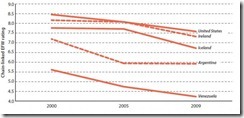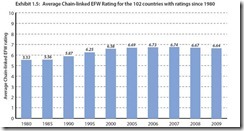The Cato Institute and the Fraser Institute has just published the 2011 Economic Freedom of the World with bleak results.
From Cato’s Ian Vasquez (bold emphasis mine)
After having risen for decades, global economic freedom has fallen for a second year in a row. That’s according to Economic Freedom of the World: 2011 Annual Report co-published today with the Fraser Institute. The average global economic freedom score rose from 5.53 (out of 10) in 1980 to 6.74 in 2007 and has fallen to 6.64 in 2009, the last year for which data is available.
As the graph below shows, the United States has had one of the largest declines in the past decade. It now ranks in 10th place compared to 3rd in 2000, largely due to higher government spending and lower ratings on “rule of law” measures.
The report documents the strong, positive relationship between economic freedom and a range of indicators of standard of living including wealth, economic growth, longer life spans, better health care, lower poverty, civil and political liberties, and so on.
Economic freedom is central to human progress. As the response of activist governments to financial and ongoing debt crises fails to address underlying issues responsible for low growth and high unemployment, this report is an important empirical reminder about the wide-ranging consequences of politics or markets in determining the use of resources.

More from the study
Economic freedom has suffered another setback
• The chain-linked summary index permits comparisons over time. The average economic freedom score rose from 5.53 (out of 10) in 1980 to 6.74 in 2007, but fell back to 6.67 in 2008, and to 6.64 in 2009, the most recent year for which data are available.

• In this year’s index, Hong Kong retains the highest rating for economic freedom, 9.01 out of 10. The other nations among the top 10 are: Singapore (8.68); New Zealand (8.20); Switzerland (8.03); Australia (7.98); Canada (7.81); Chile (7.77); United Kingdom (7.71); Mauritius (7.67); and the United States (7.60).
• The rankings (and scores) of other large economies are Germany, 21 (7.45); Japan, 22 (7.44); France, 42 (7.16); Italy, 70 (6.81); Mexico, 75 (6.74); Russia, 81 (6.55); China, 92 (6.43); India, 94 (6.40); and Brazil, 102 (6.19).
• The bottom 10 nations are: Zimbabwe (4.08); Myanmar (4.16); Venezuela (4.28); Angola (4.76); Democratic Republic of Congo (4.84); Central African Republic (4.88); Guinea-Bissau (5.03); Republic of Congo (5.04); Burundi (5.12); and Chad (5.32).
The world’s largest economy, the United States, has suffered one of the largest declines in economic freedom over the last 10 years, pushing it into tenth place. Much of this decline is a result of higher government spending and borrowing and lower scores for the legal structure and property rights components. Over the longer term, the summary chainlinked ratings of Venezuela, Zimbabwe, United States, and Malaysia fell by eight-tenths of a point or more between 1990 and 2009, causing their rankings to slip.
The chain-linked summary ratings of Uganda, Zambia, Nicaragua, Albania, and Peru have increased by three or more points since 1990. The summary ratings of eight other countries—Bulgaria, Poland, El Salvador, Romania, Ghana, Nigeria, Hungary, and Guinea-Bissau—increased by between two and three points during this same period.
The spate of government interventions which can be seen via “higher government spending and borrowing” and various forms of legislative and monetary policy interventions, especially in the developed world (meant to save the highly privileged banking sector) has definitely been weakening the underlying trends of global economic freedom.
Distortion of price signals in the marketplace has been one big symptom.
All these will continue for as long as politics is the preferred avenue to solve current social predicaments.
Nevertheless, it’s hardly been good news for the Philippines…

…whose Economic Freedom continues to decline since 2005


